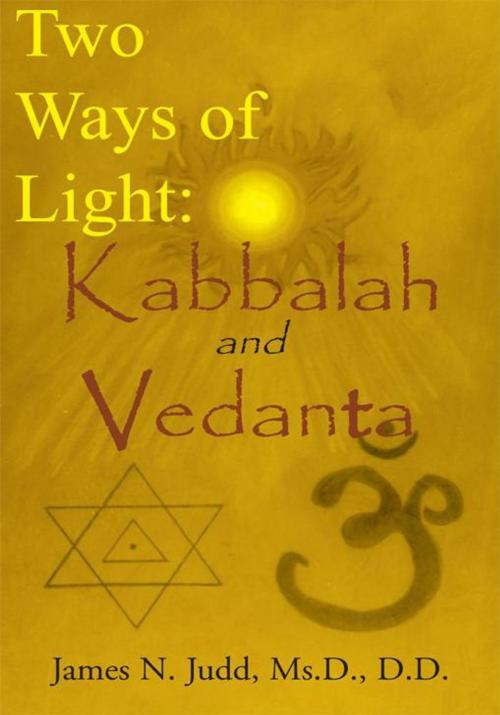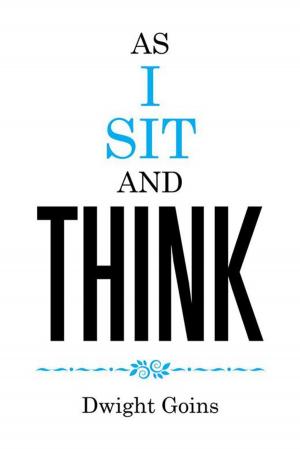Two Ways of Light: Kabbalah and Vedanta
Nonfiction, Religion & Spirituality, Reference, Comparative Religion| Author: | James N. Judd Ms.D. D.D. | ISBN: | 9781469109008 |
| Publisher: | Xlibris US | Publication: | October 18, 2000 |
| Imprint: | Xlibris US | Language: | English |
| Author: | James N. Judd Ms.D. D.D. |
| ISBN: | 9781469109008 |
| Publisher: | Xlibris US |
| Publication: | October 18, 2000 |
| Imprint: | Xlibris US |
| Language: | English |
There is an unique relationship that exists between the Jewish mystical teachings of Kabbalah and the highest spiritual philosophy of the Hindus, the Vedanta. Outwardly they appear to be vastly different, but study them, analyze them, come to understand what they are really saying, and the similarities become obvious. And such a study is not just an academic exercise, for it will be found that these ancient teachings not only augment each other in providing answers to the questions of life, but they also contain some very practical advice that can bring a greater measure of harmony in the conducting of our daily affairs.
Kabbalah and Vedanta can be called unique as:
The dedicated proponents of each one hold that theirs is the earliest spiritual teaching in the world.
Neither teaching owes its origin to any single person.
Neither can be called a separate religion in the sense of having its own set of man-made creeds and dogmas.
The profundity of their wisdom can be considered as equal.
In this book, Two Ways of Light, Dr. Judd devotes the first two chapters in examining the six principles common to all kabbalistic schools of thought, and the three essential points of Vedanta. The third chapter shows the intrinsic harmony that exists between Kabbalah and Vedanta by comparing the six principles with the three points. And the fourth chapter illustrates the practical value of both teachings through commentaries on kabbalistic verses that compare to the individual verses of a Vedantic scripture, the Isha Upanishad.
Finally, in the fifth chapter will be found not only the reasons for the basic harmony that exists between these two ancient spiritual philosophies and the major world religions, but also the relevance they have for us tody.
This book will be of interest for:
1). Those who wish to have a greater understanding of Kabbalah and/or Vedanta, and
2). Those who are looking for greater spiritual meaning in their lives.
There is an unique relationship that exists between the Jewish mystical teachings of Kabbalah and the highest spiritual philosophy of the Hindus, the Vedanta. Outwardly they appear to be vastly different, but study them, analyze them, come to understand what they are really saying, and the similarities become obvious. And such a study is not just an academic exercise, for it will be found that these ancient teachings not only augment each other in providing answers to the questions of life, but they also contain some very practical advice that can bring a greater measure of harmony in the conducting of our daily affairs.
Kabbalah and Vedanta can be called unique as:
The dedicated proponents of each one hold that theirs is the earliest spiritual teaching in the world.
Neither teaching owes its origin to any single person.
Neither can be called a separate religion in the sense of having its own set of man-made creeds and dogmas.
The profundity of their wisdom can be considered as equal.
In this book, Two Ways of Light, Dr. Judd devotes the first two chapters in examining the six principles common to all kabbalistic schools of thought, and the three essential points of Vedanta. The third chapter shows the intrinsic harmony that exists between Kabbalah and Vedanta by comparing the six principles with the three points. And the fourth chapter illustrates the practical value of both teachings through commentaries on kabbalistic verses that compare to the individual verses of a Vedantic scripture, the Isha Upanishad.
Finally, in the fifth chapter will be found not only the reasons for the basic harmony that exists between these two ancient spiritual philosophies and the major world religions, but also the relevance they have for us tody.
This book will be of interest for:
1). Those who wish to have a greater understanding of Kabbalah and/or Vedanta, and
2). Those who are looking for greater spiritual meaning in their lives.















